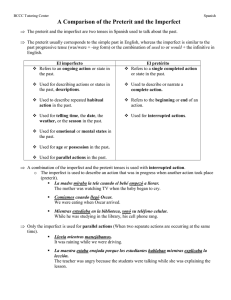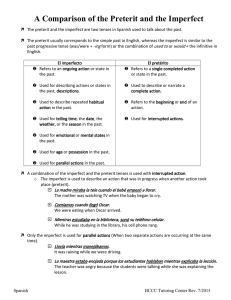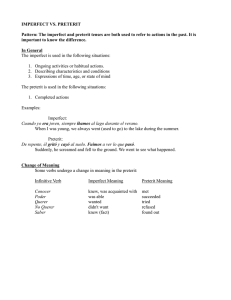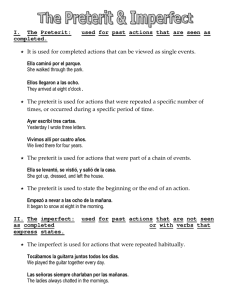Spanish: Preterit and Imperfect
Anuncio
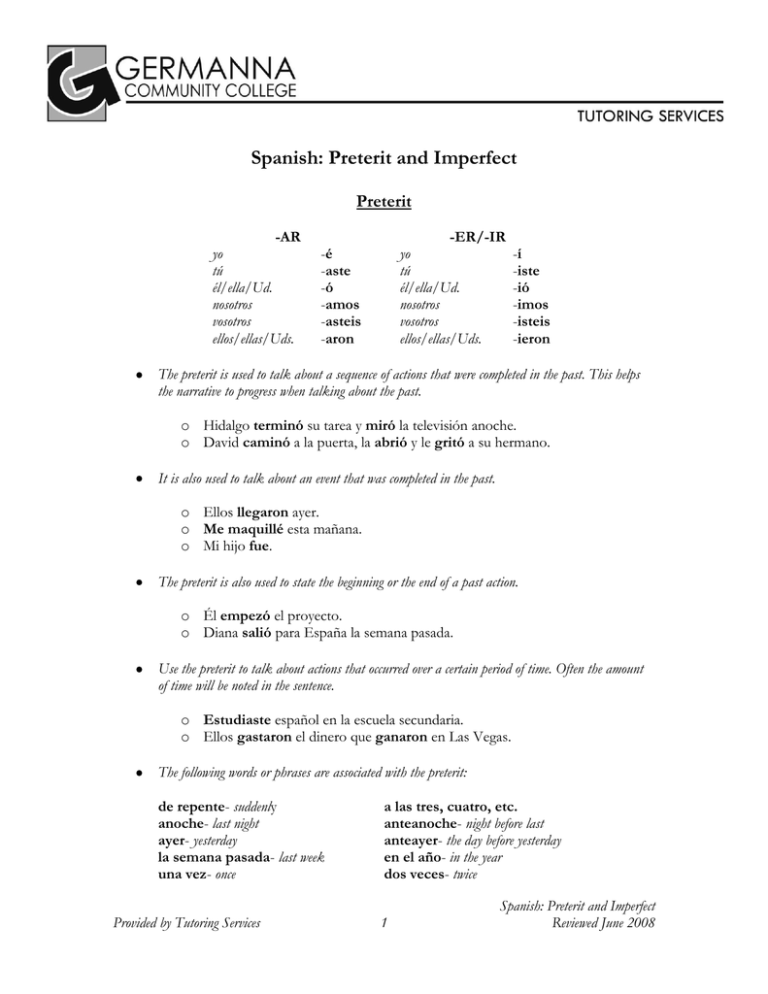
Spanish: Preterit and Imperfect Preterit -AR yo tú él/ella/Ud. nosotros vosotros ellos/ellas/Uds. -ER/-IR yo tú él/ella/Ud. nosotros vosotros ellos/ellas/Uds. -é -aste -ó -amos -asteis -aron -í -iste -ió -imos -isteis -ieron The preterit is used to talk about a sequence of actions that were completed in the past. This helps the narrative to progress when talking about the past. o Hidalgo terminó su tarea y miró la televisión anoche. o David caminó a la puerta, la abrió y le gritó a su hermano. It is also used to talk about an event that was completed in the past. o Ellos llegaron ayer. o Me maquillé esta mañana. o Mi hijo fue. The preterit is also used to state the beginning or the end of a past action. o Él empezó el proyecto. o Diana salió para España la semana pasada. Use the preterit to talk about actions that occurred over a certain period of time. Often the amount of time will be noted in the sentence. o Estudiaste español en la escuela secundaria. o Ellos gastaron el dinero que ganaron en Las Vegas. The following words or phrases are associated with the preterit: de repente- suddenly anoche- last night ayer- yesterday la semana pasada- last week una vez- once Provided by Tutoring Services a las tres, cuatro, etc. anteanoche- night before last anteayer- the day before yesterday en el año- in the year dos veces- twice 1 Spanish: Preterit and Imperfect Reviewed June 2008 el lunes/fin de semana/mes/año pasado- last Monday/weekend/month/year Stem-changing -AR and -ER verbs do not stem-change in the preterit. However, stem-changing -IR verbs change from e → i and o → u in the él/ella/Ud. and ellos/ellas/Uds. forms of the preterit. In the preterit, verbs ending in -car, -gar, and -zar have spelling changes in the yo form. -car → qué -gar → gué -zar → cé For preterit -ER and -IR verbs whose stems end in vowels, the ending -yó must be added to the él/ella/Ud. form of the verb and -yeron must be added to the ellos/ellas/Uds. form of the verb. leer → leyó, leyeron oír → oyó, oyeron The verbs ir and ser have the same form in the preterit. yo tú él/ella/Ud. fui fuiste fue nosotros vosotros ellos/ellas/Uds. fuimos fuisteis fueron The following verbs have irregular stem-changes in the preterit: Decir (to say, to tell)- dije, dijiste, dijo, dijimos, dijisteis, dijeron Estar (to be)- estuve, estuviste, estuvo, estuvimos, estuvisteis, estuvieron Haber (to have– helping verb)- hube, hubiste, hubo, hubimos, hubisteis, hubieron Hacer (to do, to make)- hice, hiciste, hizo, hicimos, hicisteis, hicieron Introducir (to introduce)- introduje, introdujiste, introdujo, introdujimos, introdujisteis, introdujeron Oponer (to oppose)- opuse, opusiste, opuso, opusimos, opusisteis, opusieron Poder (in preterit, the meaning is “to manage to do something”)- pude, pudiste, pudo, pudimos, pudisteis, pudieron Poner (to put, to turn on TV/radio)- puse, pusiste, puso, pusimos, pusisteis, pusieron Querer (in preterit, the meaning is “to try”)- quise, quisiste, quiso, quisimos, quisisteis, quisieron Saber (in preterit, the meaning is “to find out”)- supe, supiste, supo, supimos, supisteis, supieron Tener (to have)- tuve, tuviste, tuvo, tuvimos, tuvisteis, tuvieron Traducir (to translate)- traduje, tradujiste, tradujo, tradujimos, tradujisteis, tradujeron Traer (to bring)- traje, trajiste, trajo, trajimos, trajisteis, trajeron Venir (to come)- vine, viniste, vino, vinimos, vinisteis, vinieron Provided by Tutoring Services 2 Spanish: Preterit and Imperfect Imperfect -AR yo tú él/ella/Ud. nosotros vosotros ellos/ellas/Uds. -ER/-IR yo -ía tú -ías él/ella/Ud. -ía nosotros -íamos vosotros -íais ellos/ellas/Uds. -ían -aba -abas -aba -ábamos -abais -aban The imperfect is used for telling time in the past. Use the phrasing “era/eran + the time”. o Era una y media cuando ella llegó. o Eran las cinco y cuarto cuando la tienda cerró. The imperfect is also used to tell a person’s age in the past. It is stated using the verb tener in the imperfect + the age. o Christina tenía veintidós años cuando se graduó de la universidad de Madrid. o Los gemelos tenían siete años cuando su madre se les murió. Use the imperfect to talk about past actions that were in progress in which neither the beginning nor the end of the action is important. This also includes mental states as well as habitual or repeated actions that took place in the past. o Durante mi niñez vivíamos en Ávila. o Él quería visitar a su padre. Use the imperfect to provide background information about the past, such as describing conditions and characteristics in the past. o La ventana estaba abierta pero nadie estaba en casa. o Mientras sus padres dormían, la hija se escapó por la ventana There are no stem changes in the imperfect. However, the verbs ir, ser, and ver are irregular. The imperfect of hay is había. ir: iba, ibas, iba, íbamos, ibais, iban ser: era, eras, era, éramos, erais, eran ver: veía, veías, veía, veíamos, veíais, veían The following words or phrases are associated with the imperfect: mientras- while a veces- at times generalmente- generally con frecuencia- frequently todos los días- every day muchas veces- often Provided by Tutoring Services 3 siempre- always a menudo- frequently Spanish: Preterit and Imperfect Preterit and Imperfect Practice Fill in the blanks with the correct preterit or imperfect form of the verb given. Después de pasar tres días en cama, don Miguel 1) ____ _________________ (levantarse) para ir un rato a la oficina de Facetas. 2) ________________ (querer) limpiar un poquito y prepararles café a los muchachos. Pero cuando 3) ______________ (llegar), 4) ____ _______________ (encontrarse) con una sorpresa. Mariela 5) _______________ (pasar) la aspiradora por las alfombras. Johnny le 6) ________________ (quitar) el polvo a los escritorios con un plumero. Éric 7) ________________ (limpiar) los ceniceros. Diana 8) _________________ (servir) el café. Fabiola 9) _________________ (hacer) la limpieza del baño. Y Aguayo 10) ____ ________________ (ocuparse) de su oficina. Todos 11) ____ _________________ (sorprenderse) cuando 12) _______________ (ver) a don Miguel. Rápidamente ellos lo 13) _________________ (enviar) de nuevo a la cama. En la oficina, todo 14) _______________ (estar) en orden. Answers 1. 4. 7. 10. 13. se levantó se encontró limpiaba se ocupaba enviaron 2. 5. 8. 11. 14. Quería pasaba servía se sorprendieron estaba 3. 6. 9. 12. llegó quitaba hacía vieron This exercise was obtained from Enfoques Student Activities Manuel. Provided by Tutoring Services 4 Spanish: Preterit and Imperfect
